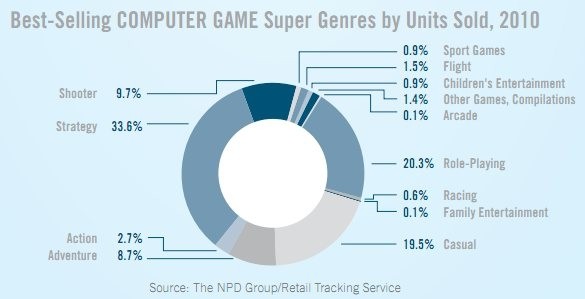With the entire gaming industry gathered in Los Angeles for E3, the Entertainment Software Association has taken the opportunity to share quite a few interesting tidbits on how the format and demographic that make up the gaming industry are changing. In its latest annual report, titled "Essential Facts About the Computer and Video Game Industry", the group notes that video games aren't a child's hobby anymore – in fact, 82% of gamers are adults.
The average gamer is 37 years old and has been playing games for 12 years. Forty-two percent of gamers are women, with those that are 18 or older representing a greater portion of the game-playing population at 37% compared to boys boys age 17 or younger which account for 13% of the market. People beyond the age of 50 are also increasingly turning to games for entertainment, accounting for 29% of gamers – an increase from 9% in 1999.

The best-selling genres in general include action games with 21.7% of the pie, followed by sports games with 16.3% and shooters at 15.9%, though when focusing on PC gaming the picture changes quite a bit. Apparently those sitting in front of a mouse and keyboard prefer strategy (33.6%), role-playing (20.3%) and even casual games (19.5%), no doubt due to the increasing popularity of free web-based games like the ones you find on Facebook.
Furthermore, as another indication of the rapidly evolving online marketplace the report claims that digital format sales in the form of subscriptions, full games, add-on content, mobile apps and social network gaming accounted for 24% of all game sales in 2010, contributing $5.8 billion to the total of $15.9 billion spent in content. Factoring in hardware and accessories the total consumer spend in the games industry last year was $25.1 billion. Other findings:
- 45% of parents reported playing video games with their children on a weekly basis,
- 9 out of 10 parents say they pay attention to the content of the games their children play
- 68% of parents believe that games provide mental stimulation or education value
- 65% of gamers play games with other gamers in person.
- 55% of gamers play games on their phones or handheld devices
- 86% know of the ESRB and 98% are confident in its accuracy and recommendations.
The study gathers sales data collected by NPD throughout 2010 and demographics from 1,200 U.S. households that have been identified as owning a video game console or a personal computer used to play gaming software. Although we would have loved to see some international figures, this still sheds some light about the current state of the industry and questions some common misconceptions about gamers. It's definitely worth checking out [PDF].